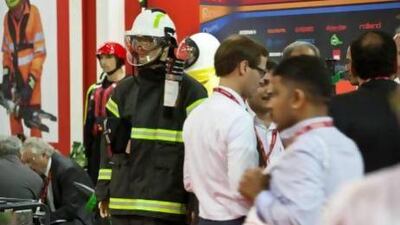Almost 1,000 companies from 54 countries crammed into the Dubai convention centre last week for the Intersec safety, security and protection technology expo.
Booths displayed mini-surveillance drones, collapsible body scan metal detectors and life-size models sporting head-to-toe fire-retardant ensembles.
Present at the expo were the Dubai Police and Dubai Civil Defence, welcoming visits from sales reps keen to show off their cutting-edge gadgets and find out for which products the Emirati Government might be in the market.
Over at the large Dubai Police stand, 16 of the 24 departments were present. The police may seem to keep a low profile - minimising their visibility on the streets, not carrying weapons - but don't be fooled. The force uses cutting edge-technology to make sure the population is safe.
"If you look, you don't see police around," says Colonel Hamid Alansari, the director of the quality assurance department. "You don't see weapons but you can sense and feel safety, and that doesn't come like that. We use the technology management side of security. We have police around everywhere, we monitor everything and we can reach any incident very quickly."
One item currently being tested by the Dubai Police is a mini-unmanned aerial vehicle that can remain airborne for one-and-a-half hours, according to Ali Zyadat, the sales manager in Dubai at Secutronic, which imports the machines made by the German company Microdrones. Uses include overhead surveillance of crash sites and areas deemed risky. Abu Dhabi Police have already acquired the technology.
The biggest threat to the population in Dubai is from bad motorists, according to Colonel Alansari.
Over at the Dubai Civil Defence stand, Taher Hassan Taher is keen to promote the organisation's business and home surveillance service.
"You can bring your investments to Dubai," says Mr Taher. "We protect them with our 24/7 monitoring systems."
This monitoring service is mandatory for businesses and labour camps, but is now also being offered to private residences. For a small annual fee, homes are surveyed on a round-the-clock basis. If, for example, a fire breaks out, this will be caught on camera.
"We will know in a second if you have smoke, says Mr Taher. "We will call you and if you do not pick up in one minute we will dispatch our fire engine to your place."
The home surveillance service has been available in Dubai since 2008 but the UAE's head of Civil Defence, Major General Mohamed Salem bin Kardous Obaid Al Ameri, has recommended it be rolled out to other Emirates.
Mr Taher admits the organisation has come under pressure to prevent fires following a number of high-profile blazes, including a fire that gutted a warehouse in Sharjah last November.
"There is some pressure [suggesting] we are lacking in some way," he says. "There are already things we have upgraded since the fire in Sharjah. Like [making sure there are] curtain walls, perimeters which are outside the building, cladding which is outside the building."
The organisation is trying its best, he says.
"We reached the point we can say we have a fewer number of fires than [other countries] around the whole world," he says. "If you go to our records you can see that."
He also says the organisation is keeping a close eye on the construction business to make sure all the products that are used comply with fire regulations. He explained that there are three steps to make sure everything is kept above board.
First is the approval of the building design by Dubai Civil Defence; second is a list of requirements issued by the organisation relating to fire alarms, firefighting ability and emergency lighting; and the third is an inspection before the building is signed off.
"We have regulations that started in 2009 that if you are caught playing with the product you will be fined," Mr Taher explains. "The minimum fine is Dh500 (US$136) and the maximum is Dhs50,000. And, by the way, during that time between 2009 and 2013 we closed two companies. I cannot say [which ones]."

